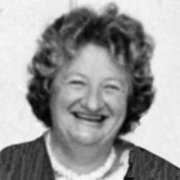
Pat Evison
Pat Evison was born in Dunedin as Helen June Patricia Blamires, to parents whose lives were closely tied to the church: West Coast-born Annie Blamires, and Australian-born clergyman Ernest Blamires. She studied acting while doing an arts degree at Victoria University, and began acting in radio plays. At that time performances were recorded directly onto acetate discs, and a fluffed line meant starting all over again.
After studying to be a teacher, Evison sailed for England in 1945. She was one of the earliest New Zealanders to win a scholarship to study at London's Old Vic Theatre Centre. She also met her husband-to-be Roger Evison, with whom she had three children.
Back in New Zealand, Evison was part of the cast of the country's first locally-written television drama. Romance All Earth to Love (1963) was set in a railway cafe, and she played one of the cafe staff. In this 1967 documentary, she can be seen among the actors learning about acting for the small screen. Later, after doing sketches for comedy show In View of the Circumstances, Evison was invited to join cast members Roger Hall and Joe Musaphia for the second season. She was also regularly appearing on-stage — including starring roles in two hits at Downstage in Wellington: Happy Days, and Peter Bland's Father's Day.
When Julian Dickon created landmark 1970 drama series Pukemanu, he wrote a part specifically for Evison. Defiantly local at a time when most of the locals on Kiwi TV screens sounded like they came from England, the series was set in a North Island forestry town. Evison played the storekeeper in whom the mainly male characters confide. In her 1998 autobiography Happy Days in Muckle Flugga, she said the role changed her life; afterwards she "was recognised from one end of the country to the other as 'Mrs Pukemanu'".
Evison was originally cast in Close to Home, New Zealand's first soap opera, as Dot. But after discovering the contract would forbid her from other television work, she withdrew, and the role went to Glenis Levestam. Evison ultimately joined the show as high school headmistress Faith, which she described as "probably pretty similar to me". Later, worried about changes that she felt would destroy the credibility of longtime characters, she wrote to the producers, outlining some of the cast's concerns. Evison argues it was all in vain.
Evison also had a long run of Australian roles. The phone began ringing back in 1975, after she won a Logie Award for playing a breast cancer patient in TV movie Pig in a Poke, directed by expat Kiwi Brian Bell. She joined American William Holden in movie The Earthling, and was mother to a young, mentally handicapped man (Mel Gibson) in Tim. Evison and Gibson both scored Australian Film Institute acting awards. In 1983 she was nominated for VD clinic comedy The Clinic, directed by David Stevens, and won good notices for a role in Gillian Armstrong musical Starstruck. Australian reviewer Evan Williams called her a figure "of infectious vulgarity". Sydney's Daily Mirror implied that her "loveable pub matriarch" was the best thing on show. "She exudes a gentle humour with a touch of pathos...".
Evison did time on Aussie TV dramas Prisoner (as an ex-prostitute) and A Town Like Alice. But her longest-running role was four and a half years on The Flying Doctors. After appearing in the original 1985 miniseries, Evison would return to play larger than life shop owner Violent Carnegie on and off over nine seasons.
Evison first acted for Kiwi filmmaking team Dave Gibson and Yvonne Mackay on 1977 short film Old Man's Story. She heard they were casting Māori actors for their first feature, Polynesian fable The Silent One (1984). After sessions with makeup and eye experts and a sunbed, she managed to win the lead female role, and spent nine tough but "magical" weeks on the Cook Islands, alongside George Henare and Zac Wallace.
Her last film appearance was as the vampire's daughter in 1992 David Blyth fantasy Moonrise (aka Grampire). Across the Tasman, she had won praise from Australian critic David Thomson for family movie What the Moon Saw (1990). She played grandmother to the main character, a theatre veteran who fondly recalls the days when she had "the best legs on the Tivoli circuit".
Evison's long stage career was recognised back in 1980, with an OBE for services to theatre. In 1993 she became a Dame Commander of the Order of the British Empire,for services to theatre, television and the community. Evison passionately campaigned on many causes, including tax changes for actors, equal pay for women, and an unsuccessful effort to save Wellington's Broadcasting House recording studios.
Pat Evison passed away on 30 May 2010. She was three days shy of 86.
Profile updated on 29 May 2020
Sources include
Pat Evison, Happy Days in Muckle Flugga (Auckland: HarperCollins, 1998)
Jonathan Dennis Library - Ngā Taonga Sound & Vision
Robert Boyd-Bell, New Zealand Television - The First 25 Years (Auckland: Reed Methuen Publishers, 1985)
Diana Dekker, 'A Class Act' (Interview) - The Evening Post, 4 March 1998, page 21
Trisha Dunleavy, Ourselves in Primetime - A History of New Zealand Television Drama (Auckland University Press, 2005)
Frances Grant, Interview with Pat Evison - The NZ Herald, 28 March 1998
John Smythe, Downstage Upfront - the first 40 years of new zealand’s longest-running professional theatre (Wellington: Victoria University Press, 2004)
David Stratton, The Avocado Plantation - Boom and Bust in the Australian Film Industry (Sydney: Pan Macmillan Publishers Australia, 1990)